Not just Blade Runner. Screen adaptations of PHILIP K. DICK, a science fiction visionary
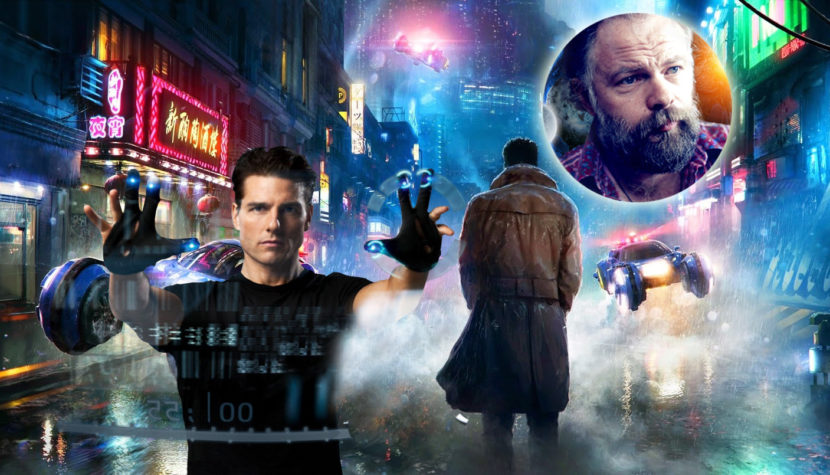
Philip K. Dick wrote over 40 novels and nearly 120 short stories, at least some of which have entered the canon of world literature. Filmmakers eagerly reach for his prose, but usually use only the science-fiction entourage, omitting what is most important in Dick: philosophical, theological and sociological aspects. As a result, out of the 14 cinema and television adaptations of his works, only four survive, one of which is an undisputed masterpiece.
Blade Runner (1982)

What can be said about this film based on Philip K. Dick that hasn’t already been said without falling into cliché? For the above-signed, it is the greatest picture in the history of cinema – first seen late at night on German satellite TV, with dubbing and breaks for bawdy commercials. Later watched, admired and analyzed dozens more times. Source material – the novel Do Androids Dream of Electric Sheep? – was treated quite liberally, but somehow the director (Ridley Scott) and writers (Hampton Fancher, David Peoples) managed to preserve the key points raised by Dick. The writer died four months before the premiere of Blade Runner, but managed to watch twenty minutes of footage in a closed screening and was delighted with what he saw. Although the differences are significant, the book and the film complement each other, he said. If you watch the movie first and then read the book, you will find more content in the book than in the movie. But it works the other way around. If you start with the book, the movie will seem more substantial to you. The two versions of the story are therefore not contradictory. Denis Villeneuve’s excellent sequel Blade Runner 2049 was not based on Dick’s work, so it was not included in this list.
Total Recall (1990)
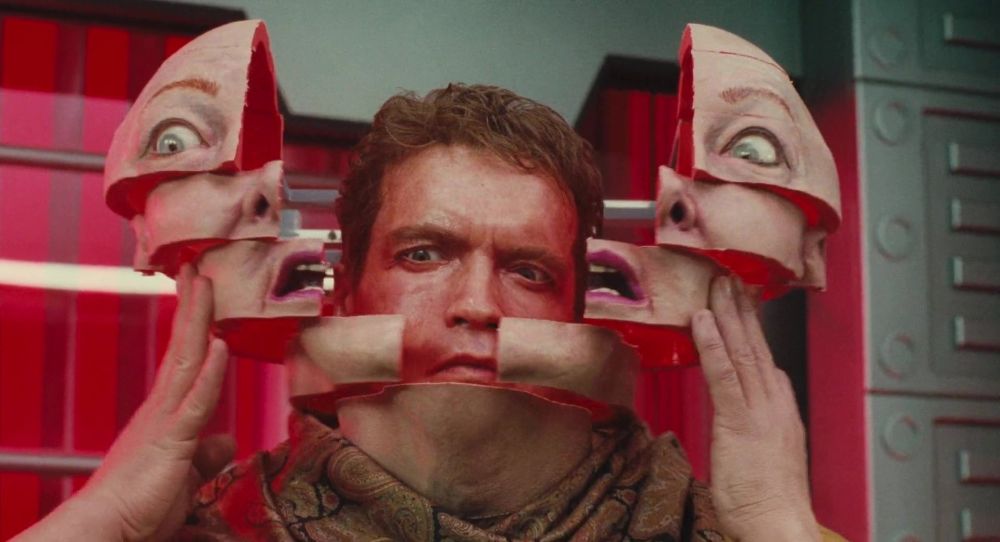
In the story We Can Remember It For You Wholesale, only one shot is fired (and it misses the mark), while Paul Verhoeven’s film based on it is a bloody, brutal action movie with chases, shootouts, fights and Arnold Schwarzenegger in the lead role. In short: Dick on steroids. These were the critics’ accusations against the film just after its premiere, but over time Total Recall gained the status of one of the best science fiction titles of all time. Today, Verhoeven and the screenwriters (Ronald Shusett, Dan O’Bannon and Gary Goldman) are praised for their skillful blend of entertainment and challenging content about self-awareness, memory, identity, authoritarianism and colonialism. All this is present in the film rather on the margins, while the thesis that viewers watch Total Recall mainly for its philosophical values is very risky. Viewers want to see the cruel tyrant Cohaagen mercilessly crushed by Martian pressure, the armless Richter falling over a cliff, and Arnie shooting Sharon Stone with the words “Consider this a divorce” on his lips. In 1999, one season of the Total Recall 2070 series was created, but it has absolutely nothing in common with Dick’s work except the name of the Rekall corporation and the idea of virtual holidays.
Confessions d'un Barjo (1992)

Dick made literary history as a science fiction writer, but his extensive legacy also includes a dozen heavy-handed realistic fiction. Only one was published during the writer’s lifetime, Confessions of a Crap Artist, a bitter portrait of a toxic marriage set in northern California in the late 1950s. Based on this book, the French director Jérôme Boivin made a picture entitled Confessions d’un Barjo, changing the names of the characters and moving the action to contemporary France. With over 260 pages, the novel was condensed into just 78 minutes of film, so it’s no wonder that there are plenty of cuts, abbreviations and simplifications. In the literary prototype, the slow decay of marital relations is shown gradually and deliberately, while in the film everything happens quickly and without justification. To make matters worse, Dick’s melancholy has been covered up with a screen of a typically French farce, and the final tears of the repentant courtesan stand in complete opposition to the clearly psychopathic nature of her book counterpart. Boivin treated the starting material in a superficial and pretextual way, and the end result resembles a cheap TV movie. And that annoying, ubiquitous song with the word barjo repeated over and over…
Screamers (1995)

The above signed was in this movie in the cinema in 1996 and already knew then that it was a complete misunderstanding (incidentally, it was then shown as Screamers – The Cry of Doom and it is really hard to say why later he began to share the title with Robert K.G. Temple’s book about alleged contacts of African Dogon tribe with aliens). Screamers basically stays true to the plot of the short story Second Variety on which it was based, the problem with the film by Christian Duguay lies elsewhere. First of all, it is a low-budget B-movie, which reduces Dick’s philosophical questions about human nature to the level of a trivial Alien-like sci-fi horror (the link is Dan O’Bannon, the screenwriter of both films, who also wrote the script for Total Recall by Verhoeven). The ending even included such absurd scenes as the explosion of a nuclear microcharger and kung-fu style combat! The forced love story between a human and a robot is also completely unnecessary, which in turn is absolutely secondary to Blade Runner. And the ambiguous finale isn’t half as ominous and depressing as the original. In 2009, there was an equally bad sequel Screamers: The Hunting.
Impostor (2001)
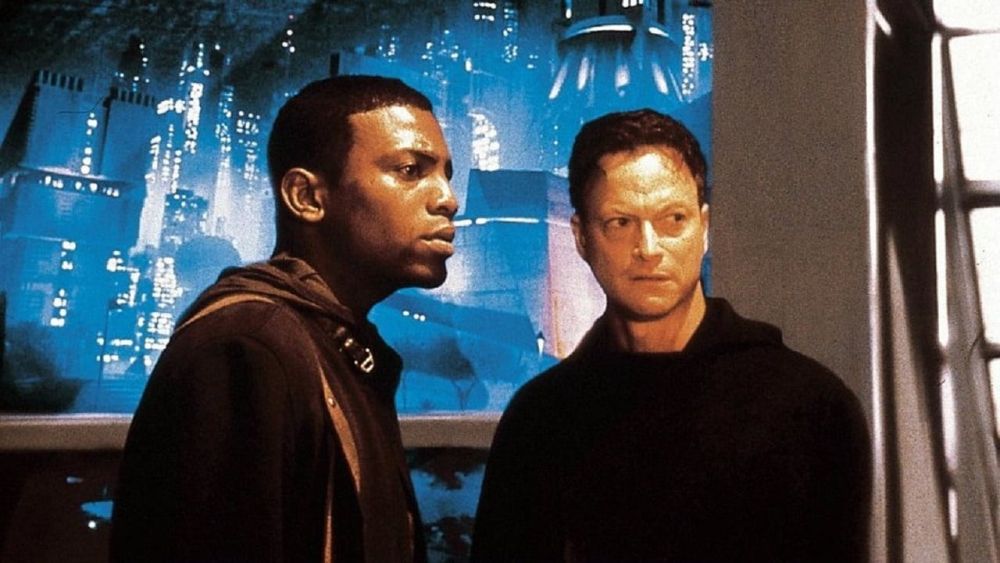
The story that inspired Gary Fleder’s is in fact Impostor. It was the first piece in which Dick touched on one of the leading themes of his work: the essence of humanity and its limits (Since then, of course, I drove it to death, but it still fascinates me – admitted years later the author of The Three Stigmata of Palmer Eldritch) . In vain, however, to look for similar considerations in this tiresome, unsuccessful screen adaptation, because the literary content was treated with neglect, sacrificing philosophy on the altar of stupefying etertainment. Of course, there was a romantic thread, which was barely outlined in the story, and here it was exposed as the main source of tension between Spencer Oldham, accused of being an alien android, and his wife Maya. The only positive surprise is the non-Hollywood finale – precisely because it is faithful to Dick’s original vision, for whom happy endings were rare. At the same time, Impostor is a perfectly rounded film devoid of its own style, a film like Frankenstein’s monster stitched together from dozens of other science fiction productions. In 1962, an episode of the British television anthology Out of This World was made based on the story.
Minority Report (2002)

Steven Spielberg and Philip K. Dick represent two completely different worlds. The first is a joyful optimist, a good-natured juggler with the soul of an eternal child, who sees in machines not only a chance for the spiritual development of humanity, but even a replacement for man on Earth (see unbearably sweet A.I. Artificial intelligence). The second is an extreme pessimist, a gloomy philosopher prophesying the imminent destruction of the human species under the pressure of technological progress and the associated threats. Therefore, it should not come as a surprise that the on-screen marriage of a juggler and a philosopher turned out to be somewhat of a misalliance. Yes, the percentage of Dick in Spielberg is quite high – there are aggressive advertisements nesting deep in the consciousness, there is an oppressive apparatus of universal control and telepathic predispositions used by the authorities for their purposes. But where the writer expressed his fear of the achievements of civilization, the director betrays a poorly concealed fascination with a technicalized reality which, in his naivety, he believes can be controlled. As if to confirm this thesis, Spielberg serves the audience with the obligatory tearful happy ending, which contradicts the ambiguous finale of Dick’s story. In 2015, Minority Report was resurrected as a series, not without reason being canceled after one season.
Paycheck (2003)

With John Woo behind the camera, you know what to expect: lots of gunfire, chases, explosions, beatings and broken glass, and little sense. Interestingly, the director planned a thriller in the spirit of Hitchcock, but the action-oriented script prevented him from doing so. Its author, Dean Georgaris, doubts the viewer’s intelligence, so in his text he not only repeats scenes, but also makes the characters comment on current events. For example, if someone suffers from dyscalculia and attention deficit disorder, they need not worry, because Ben Affleck will say out loud the value of the number visible on the screen: Ouch, $92 million! Casting this actor in the role of a mastermind-engineer is hardly credible, because it is an example of the excess of physical form over mental content (Affleck received the Razzie for his wooden performance for a reason). There’s also Paul Giamatti as a not-so-funny comic relief and Uma Thurman as the cut-out, noble girlfriend of the main character. Everything here is generic and thoughtless, including the final duel maintained in the style of a crude computer game. And because it was a time of rapid development of computer animation, there was also a place for the nuclear explosion, beloved by the filmmakers, but absent from Dick.
A Scanner Darkly (2006)

Published in the late 1970s, the book is considered Dick’s most personal work. I am the novel itself. At that time, it was our entire society. The fantastic plot about the fate of drug addicts addicted to Substance A – a dangerous drug that divides the brain into two rival halves – the writer drew from his many years of experience with narcotic substances. More than three decades later, the novel was brought to the screen by Richard Linklater using a then-unique and extremely complex rotoscoping technique. This type of animation allowed the creators to convincingly show the unreality of the world perceived through the eyes of an intoxicated person. But the film is also very strong at the level of the script (by the director himself) and the cast (Robert Downey Jr.!). A Scanner Darkly is in line with the spirit of the original and all of Dick’s work, which makes it undoubtedly one of the best screen adaptations – right next to Blade Runner, the first Total Recall and Radio Free Albemuth. It is a pity that the film lacked a funny scene from the novel, in which the characters wonder how to smuggle a huge lump of hashish across the border.
Next (2007)

Almost every Lee Tamahori film is one to stay away from, and Next is no exception to that rule. From the story The Golden Man, devoted to the issues of power, only the personal details and paranormal skills of the main character remain here, the other elements are typical Hollywood clichés. According to the convention, the first chase takes place already in the 10th minute of the film, and in the finale there is a traditional great shootout interspersed with several picturesque explosions, including – and how! – the explosion of the atomic bomb over Los Angeles. And then it turns out that it was all just a vision of Cris – one of several possible variants of reality. However, this is not a satisfying plot twist, but a great chutzpah that is an expression of the helplessness of the creators who go to great lengths to please the viewers (another example: a scene clumsily copying a certain famous sequence from Kubrick’s A Clockwork Orange). Pyramidal nonsense, which is not saved even by an episode involving Peter Falk, a nice Lieutenant Columbo. While Cage’s participation in this disastrous venture is not surprising (the actor was in the midst of a professional crisis at the time), the question arises: why would an actress of the caliber of Julianne Moore agree to it? Next is the worst film adaptation of Dick.
Radio Free Albemuth (2010)
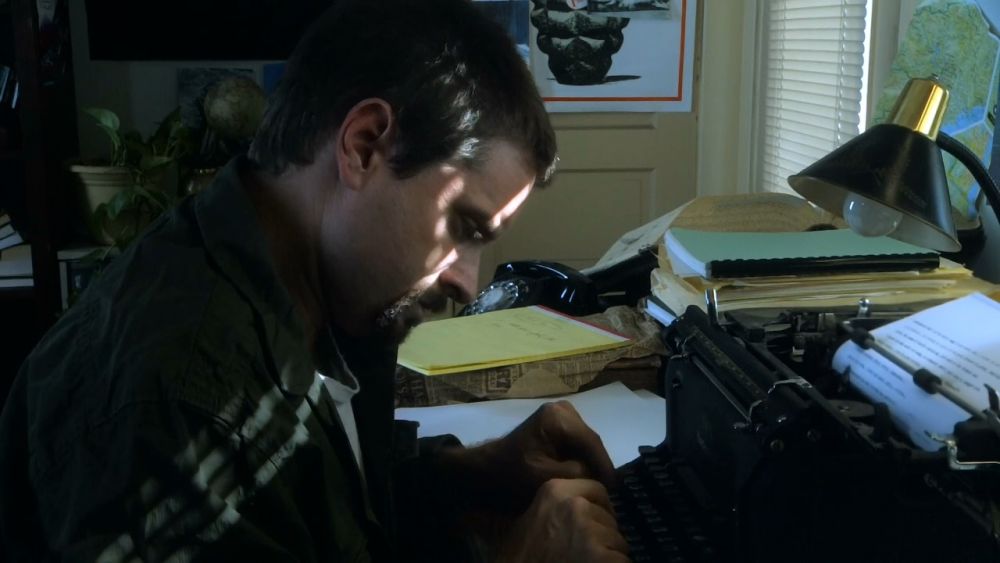
Dick wrote Radio Free Albemuth in the mid-1970s, but when Bantam refused to publish it, Dick made extensive rewrites. They were so important that the book was finally published under the title VALIS, and the first unaltered version of the manuscript was not published until three years after Dick’s death. The plots of both novels revolve around the writer’s infamous mystical experiences in February and March 1974 (more on this in the invaluable biography God’s Invasions. The Life of Philip K. Dick by Lawrence Sutin and The Exegesis of Philip K. Dick edited by Pamela Jackson and Jonathan Lethem). Why the filmmakers decided to make the rejected draft, and not the canonical novel, into a film – one can only guess. The feature debut of director and screenwriter John Alan Simon was clearly made at a cost. The low budget is most evident in the primitive, by the standards of the film industry, special effects. The technical shortcomings, however, recede into the background, because you can feel the heart and deep understanding of Dick’s work in this film. The creators faithfully stick to the dystopian vision of the writer, played here by the great Shea Whigham. He is partnered by Jonathan Scarfe and Alanis Morissette, who has probably never been more beautiful.
The Adjustment Bureau (2011)
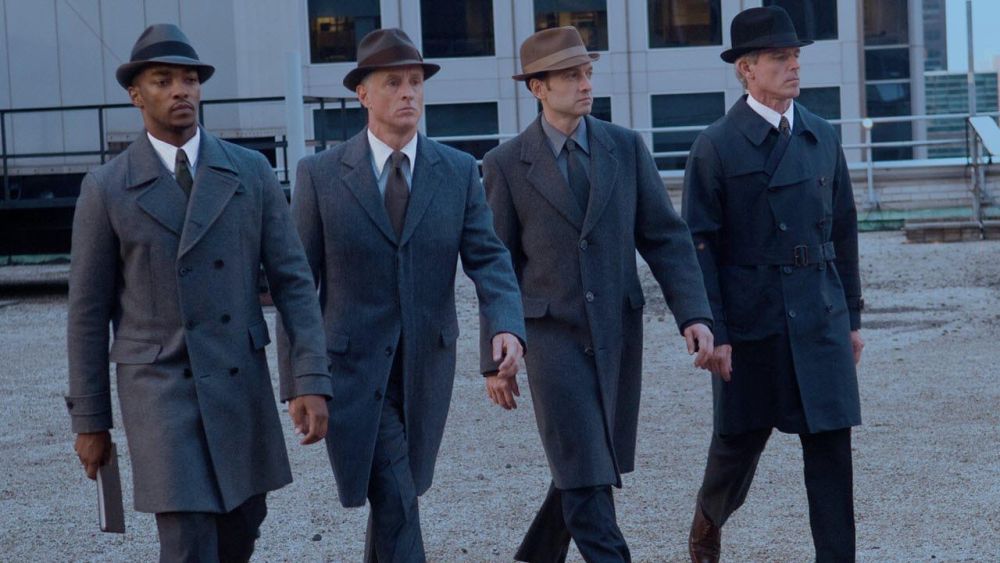
Another very loose adaptation. From the story The Adjustment Team, only the thread of an almighty organization secretly controlling the fate of the world was taken, the rest is the invention of the screenwriter and director George Nolfie. The plot is as follows: an American congressman is running for the Senate, but a photo from the past published by the tabloid press undermines his efforts. The young politician is ready to completely abandon his career for a dancer he accidentally met, but representatives of the The Adjustment Bureau suddenly appear between the lovers. They are the subordinates of the mysterious Chairman (implicitly: God) – deadly serious hatters who are a combination of a bureaucrat and an angel, but vulnerable to typical earthly weaknesses, such as a nap in the park, a blow straight to the jaw or – for completely unknown reasons – heavy rainfall. There’s supposed to be something about free will here, but ultimately nothing significant. Something about the power of love that causes inner transformation, but not much beyond platitudes. Something about the role of chance and destiny, but casually. The director said that the intention of The Adjustment Bureau is to ask questions. If so, my question is what was the purpose of putting Dick in a mere romance novel?
Total Recall (2012)

More of a remake of Verhoeven’s film than a faithful film adaptation of Dick’s story – in addition, devoid of several key themes of the 1990 film. The setting is not a colony on Mars, but an Earth ravaged by chemical warfare, Richter and Lori have been merged into one person, and the character of Kuato – a disgusting mutant leading the rebels – has been completely removed from the script. Even the Rekall company is no longer housed in sterile offices, but in rooms resembling a futuristic opium den. Despite these changes, the first half of Len Wiseman’s film is promising: a well-created, believable world (although drawing heavily from both Blade Runner and Minority Report), clear nods to the previous version (a prostitute with three breasts, an oddly familiar image of a woman at customs) and the evocative atmosphere of bewilderment and paranoia. However, the number of chases, gunfights and explosions increases with each passing minute, covering up all the film’s merits. As a result, at the end of the two-hour screening, the viewer loses interest in the story of the amnesia-stricken killing machine. It is interesting that in the future, dubstep reigns in dance clubs – a genre that was already a thing of the past during the production of Total Recall.
The Man in the High Castle (2015–2019)

It is one of the most acclaimed novels in the Dick bibliography, as well as a flagship example of the genre called alternate history. The idea is brilliant in its simplicity: World War II is won by the Axis powers, which divide the entire globe into occupation zones. In the western territory of the former USA, the Pacific States of America are established, controlled by Japan, while the eastern part of the country – separated by a buffer zone in the Rocky Mountains – falls under the rule of Nazi Germany. The heroes of the book read Hawthorne Abendsen’s sci-fi novel The Grasshopper Lies Heavy, in which the Allies won the war (however, this is not the world familiar to Dick’s reader, but another variation on a parallel reality). The plot could fit into a decent, three-hour film, while on the basis of The Man … as many as forty episodes of the series were created under the auspices of producer Ridley Scott. The first season did justice to the literary original – even if Abendsen’s book was changed to a reel of a banned film – but the following seasons unnecessarily multiplied plots and characters that were not in the novel (for example, the American Nazi John Smith). In this way, the study of the phenomenon of history became another TV soap opera.
Electric Dreams (2017–2018)

The creators of this anthology, following the example of many previous adaptations of Dick, focused on the fantastic form, not on the philosophical content of his works. And yet, as Stanislaw Lem rightly noted: One cannot imagine I. Asimov or A. Clarke without the gear of SF; their creativity, after subtracting the fictional “instrumentation”, will collapse to zero. But one can imagine Dick beyond the age of technical mythology; for example, as a writer embedded in spiritualism or pseudo-historical fairy tale; for what Dick has to say is neither technological nor scientific; these areas are his costume science, and it is known that Elizabethan dramas can also be performed in tailcoats or jeans. […] It is a literature of existential dramas, articulated with the junk of SF kitsch and trash. The choice of stories that served as the basis for subsequent episodes is also debatable – they come from the early period of creativity, when Dick was just honing his craft. In addition, their original meanings have been lost due to radical plot modifications. As a result, only one episode does Dick’s favor and that is The Commuter with a moving performance by Timothy Spall, the eminent British actor known for Mike Leigh’s films.

